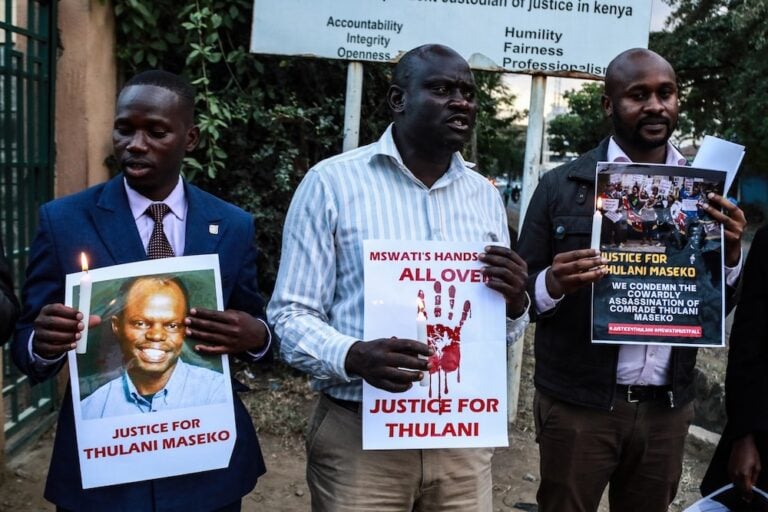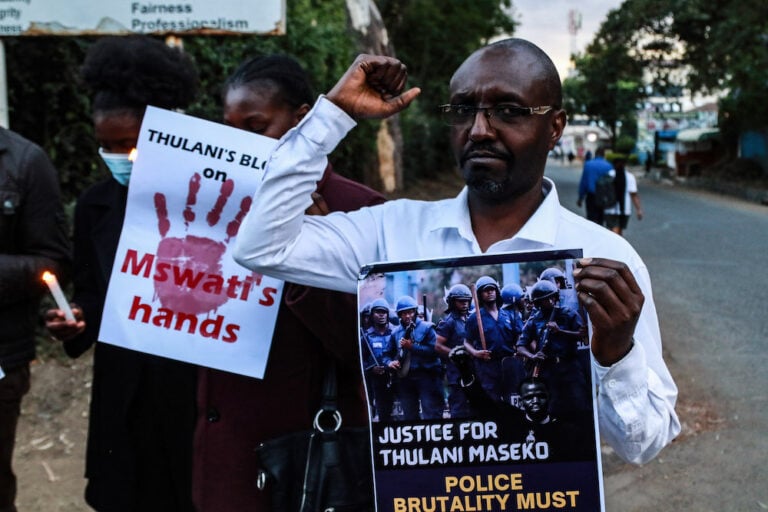(MISA/IFEX) – The following is a MISA press statement: Court victory for “The Guardian of Swaziland” The Media Institute of Southern Africa welcomes the August 31 ruling of High Court Judge J Annandale which effectively allows “The Guardian of Swaziland” newspaper to resume publishing. The newspaper emerges from a 4-month ban, announced on May 4 […]
(MISA/IFEX) – The following is a MISA press statement:
Court victory for “The Guardian of Swaziland”
The Media Institute of Southern Africa welcomes the August 31 ruling of High Court Judge J Annandale which effectively allows “The Guardian of Swaziland” newspaper to resume publishing. The newspaper emerges from a 4-month ban, announced on May 4 by Minister for Public Service and Information Mntonzima Dlamini, through Legal Notice 69 of 2001. That notice was today declared invalid. In banning the publication, Minister Dlamini cited Section 3 of the Proscribed Publications Act of 1968, which gives his office unlimited powers to ban or suspend publications that do not conform with “Swazi morality and ideals.”
The issuing of Decree No 2 of 2001, on June 22 by His Majesty King Mswati III, further impeded the fight for press freedom and freedom of expression in that country. Article 13 of the Decree reads: “Proscription: Where a magazine, book, newspaper or excerpt thereof is proscribed in terms of the Proscribed Publications Act, 1968 the Minister concerned shall not furnish any reasons or jurisdictional facts for such proscription. No legal proceedings may be instituted in relation of such proscription”.
Decree No 2 of 2001 was repealed on July 25, and followed by Decree No 3 which, after further investigation, did in no way improve the press freedom situation in that country. MISA’s office in Swaziland (MISWA) at the time expressed the fear that the Swazi government, being aware of its deficient case for banning the newspaper, had hoped to use the oppressive legislation contained in the decree to ensure the dissolution of the independent media in that country.
Unfortunately this court application, although successfully restoring the newspaper’s eligibility to commence publishing, did not provide for the confiscated newspapers to be returned to the Guardian Media Group (Pty) Ltd.
The editor of “The Guardian of Swaziland”, Mr Mtato, informed MISA that the newspaper’s board of directors would meet as soon as possible to discuss the way forward. He added that it was premature to make a statement about when the paper will be available in print.
Since receiving notice of the banning of the newspaper on May 4, 2001, ten of the thirteen staff members of the newspaper had been retrenched. MISA commends the dedication of the management of the newspaper who has continued to publish an electronic edition of the
newspaper on their website at www.theguardian.co.sz
Background Information
On May 4, 2001, the Government of Swaziland banned the print version “The Guardian of Swaziland” newspaper from circulating in the country, in the wake of the celebration of the 10th anniversary of the Windhoek Declaration. The newspaper was accused of not fulfilling all the requirements under the country’s media laws.
Police were deployed throughout the country to collect copies of the newspaper. The police said that they received an order to confiscate the newspaper on the basis that the newspaper was operating illegally. According to news reports, the Swaziland Cabinet decided to ban “The Guardian of Swaziland”, at a special meeting on Thursday, May 3, 2001, and the minister for information was instructed to convey the decision to the newspaper.
The newspaper’s management was called to the Minister’s Office where they were told that the newspaper was operating illegally. The minister claimed that the newspaper did not comply with all registration requirements. The newspaper management was instructed to cease publishing the newspaper until they complied with the law.
“The Guardian of Swaziland” had become a target immediately after printing stories about the King, his Queens and the Prime Minister which, among others, covered the King’s illness and the
rumour that one of his wives had poisoned him.


